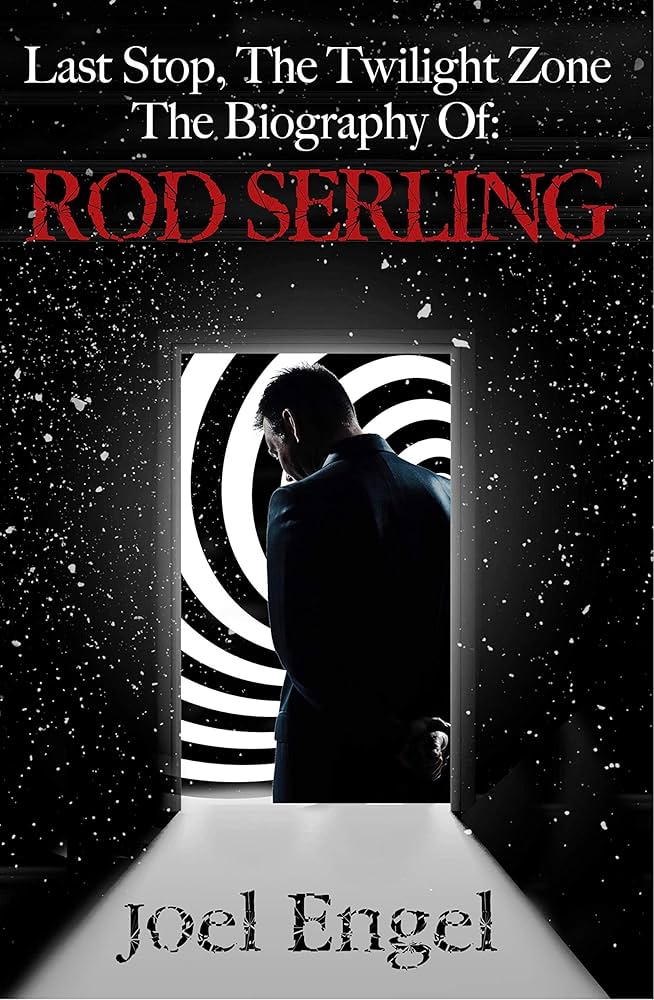Last Stop, the Twilight Zone: The Biography of Rod Serling (2014) by Joel Engel.
Good Reads meta-data is 322 pages, rated 3.81 by 59 litizens.
Genre: Biography.
DNA: USA.
Verdict: The one and only.
Tagline: Next stop.
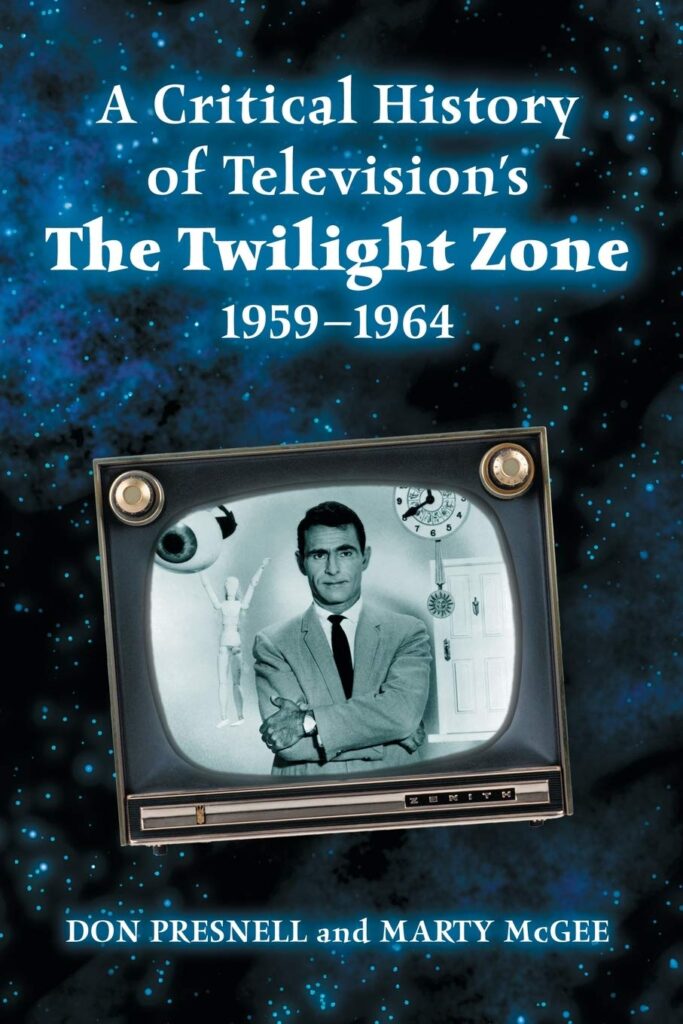
Born (1924-1975) the second son to a comfortable, well-off family in Binghamton New York, which was a small company town based on a shoe factory whose owners practiced Quaker philanthropy with its work force. Idllic images of towns and villages were born from that experience to return in scripts years later.
Even as a five-year-old he craved the limelight and was forever thereafter trying to be the centre of attention. A school teacher guided that incessant demand into plays and debate, and later into journalism. He edited his high school newspaper and was class president, having campaigned hard for the honour. At 5’ 4” both the high school football and basketball coaches rejected him as too small. That put a chip on his shoulder.
The day he graduated from high school in 1943 he enlisted in the US Army and volunteered for the most rigorous training as a paratrooper. Only 1 in 8 of volunteers succeeded, and he was one of them. He made 37 jumps, including two in combat conditions in the Philippines with the 511th PIR where 400 men of this unit were killed or wounded. There are some remarkable scenes in Norman Mailer’s The Naked and the Dead of such combat. The fragility of life was another recurrent theme in Twilight Zone born of this experience. He also took part in the house-to-house fighting to liberate Manila from the suicidal Japanese defence. He had two wounds, one a knee that forever gave him pain and which occasionally even as he recorded the prologue to the Twilight Zone would seep. In addition to the two Purple Hearts, he had earned a Bronze Star.
He went to Antioch College on the G.I Bill and set himself to write for radio, starting with the campus radio. Again guided there by a teacher. At the time cheapskate sponsors came up with the idea of having listeners submit scripts to anthology programs, and Serling did so, winning more than once a cash prize, and more important, the glory of having his words broadcast into the ether. He loved both the money and the glory. There was no looking back from that. The anthology format went into Twilight Zone.
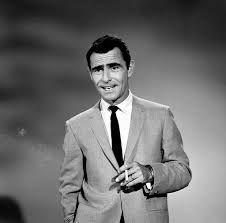
While at college he met and married Carolyn Kramer, she a Christian and he a Jew. They compromised on religion and became Unitarians (who have no religion, people used to say). She brought a summer home on a lake to the union, but while in college to generate the income of a married man, Serling took a job test jumping parachutes at a nearby army base and then ejector seats. He succeeded 3 others, all of whom had been killed in tests.
First as an unpaid intern and then as a staff writer he worked for radio stations writing everything from advertising jingles, to reports of garden parties, the weather, drama, news bulletins, commercials, and comedy. Then came television with an even more voracious demand from words, and he supplied them. He now submitted scripts to television programs, amassing a volume of rejections, but enough acceptances to eke out a living.
He wrote 71 scripts for Kraft Television Theatre, and then came the 72nd, called Patterns (1955), a kind of Caine Mutiny set in the corporate world. It was triumph in the pages of the New York Times and he was a made-man. There followed another triumph with Requiem for a Heavy Weight (1956). His name now sold and he sold off 50 or more of his earlier rejected scripts as fast as possible to capitalise on his newfound fame. Many of these were mediocre at best and reduced his market value. This desire to spread his seed, despite devaluing it, is a recurrent tide in his life.
He wrote scripts about negro lynchings, hated of Jews, corporate corruption, government incompetence, quick-thinking women, incompetent bullies, and the like but found commercial sponsors insisted on watering the themes down to nearly nothing. To skirt this barrier he adopted the fantasy, science fiction cloak, encouraged by Desilu Productions, and produced the pilot of Twilight Zone in 1959. It lasted five seasons when a season was 39 episodes. By the end he was dried up, and accepted the termination, though he did not write them all he did read and edit those written by others whom he hired and directed, but he wrote the bulk. During its run in proved to be both a commercial and critical success.
Twilight Zone made him famous and wealthy. It is unlikely that any other writer ever has been so well known around the world. That celebrity also carried expectations, none of which he could fulfil in later years, and he knew it, but could not change his ways. The sirens’ song had done its worst to him.
Those successes enabled him to convince the producers to record the episodes to be screened again, the rerun. This was not the common practice at the time when one live airing was the norm. When taping started it allowed better productions, but once aired the programs were taped over for the next episode. Serling, and others, argued that saving taped programs for summer reruns recouped the cost of taping and, he argued, and also allowed the broadcast rights to be sold, which they were and syndicated to local stations.
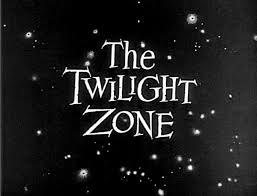
Leaving aside the many details, what emerges is a man who was driven by an insatiable craving for external validation, and, in fact, could not live without it. Was this entrenched need a result of his height (he wore elevator shoes from high school on) or being a lifelong younger brother, or what?
When Twilight Zone ended he sold himself to the highest bidder, not because he wanted or needed the money, he was rich beyond Croesus, but for the affirmation. He did TV commercials, became a regular on daytime television game shows, hit on every woman that crossed his path from stewardesses to college students asking for an autograph to waitresses to secretaries and more, instructed his agent to say yes to every commercial offer, composed and tried to sell film scripts, teleplays, theatrical dramas, short stories, novels, and mostly failed.
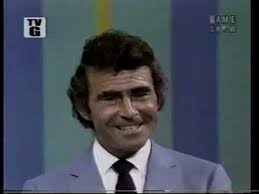
He prostituted himself in every imaginable way to find approval, affirmation, and adulation, becoming just the kind of hollow man he had decried in his Kraft Theatre dramas years ago. What is worse is that he knew it but the compulsion was too strong. He was an unhappy man. An example of human bondage.
Even those projects that were completed and credited (and paid) to him succeeded, despite, not because his contribution, e.g., Seven Days in May. His name is there but he contributed little to it.
It is another example of a poor little rich boy’s search for happiness, and the failure of that quest. It is hard to sympathises with his emptiness, the more so, because it was all so repetitive. He learned nothing, and forgot almost everything.
What killed him in the end was one of the products that he advertised, cigarettes. He smoked 60-80 a day himself. That might almost be a Twilight Zone episode, killed by the golden goose.

